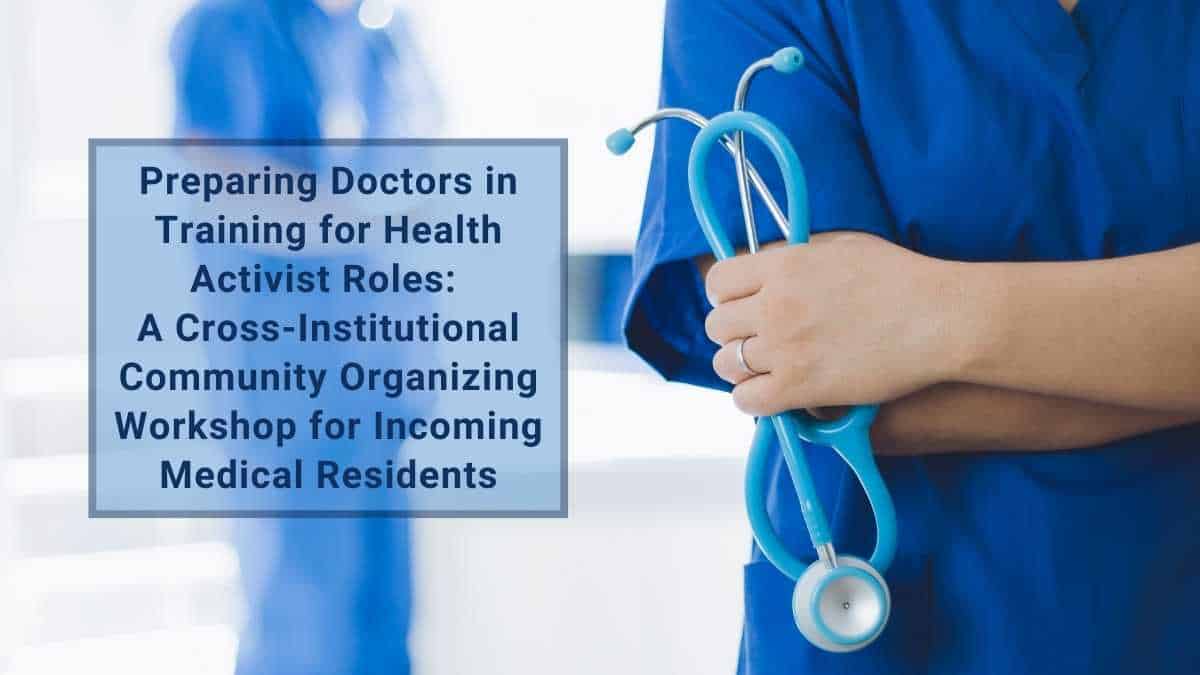
Preparing Doctors in Training for Health Activist Roles: A Cross-Institutional Community Organizing Workshop for Incoming Medical Residents
Utilizing community organizing and public narrative as a framework for effective physician advocacy to address health inequities.
Abstract
Introduction: Physicians are increasingly being called on to address inequities created by social and structural determinants of health, yet few receive training in specific leadership skills that allow them to do so effectively.
Methods: We developed a workshop to introduce incoming medical interns from all specialties at Boston-area residency programs to community organizing as a framework for effective physician advocacy. We utilized didactic sessions, video examples, and small-group practice led by trained coaches to familiarize participants with one community organizing leadership skill—public narrative—as a means of creating the relationships that underlie collective action. We offered this 3-hour, cross-institutional workshop just prior to intern orientation and evaluated it through a postworkshop survey.
Results: In June 2019, 51 residents from 13 programs at seven academic medical centers attended this workshop. In the postworkshop survey, participants agreed with positive evaluative statements about the workshop’s value and impact on their knowledge, with a mean score on all items of over 4 (5-point Likert scale, 1 = strongly disagree, 5 = strongly agree; response rate: 34 of 51).
Discussion: The workshop effectively introduced participants to community organizing and public narrative, allowed them to apply the principles of public narrative by developing their own stories of self, and demonstrated how these practices can be utilized in physician advocacy. The workshop also connected participants to their motivations for pursuing medicine and stimulated interest in more community organizing training.
Access Resource – Acceder a recursos
Excerpts from Article
Discussion
We successfully developed a cross-institutional workshop to introduce incoming medical interns to community organizing as a framework for effective physician advocacy. The evaluation responses showed that participants found the experience to be valuable and were interested in participating in more community organizing training in the future. The facilitators and coaches observed that timing the event just prior to intern orientation allowed us to capture physicians at a unique moment of reflection on their professional identities. The facilitators also found that the cross-institutional structure helped break down silos and build working relationships both amongst participants and between the workshop organizers and the participating programs.
This publication adds to the literature on the use of community organizing and public narrative to train health professionals. While Dr. Ganz’s framework has been used to teach community organizing in a variety of settings, including to health professionals,15 to our knowledge it had not yet been used as a method for training medical residents early in their careers.
By targeting incoming interns, this workshop captured the unique impact that public narrative can have on professional identity for those who are still developing as physician advocates.
Furthermore, while advocacy curricula are increasingly being incorporated into graduate medical education, they are not standardized, the majority are not cross-institutional, and we are not aware of any that utilize community organizing skills.3,4 By utilizing Dr. Ganz’s well-established pedagogy, this workshop features a curriculum that is readily reproducible at other centers.
Future Directions
This workshop could be delivered as a stand-alone event or as part of a series of health equity–oriented modules. Though designed to target medical residents, the content is applicable across various levels of training (e.g., medical students, residents, and faculty) and health professions (e.g., physician assistants and nursing). The optimal timing for this workshop is 3 hours, but it can be shortened by sharing fewer stories in front of the large group or shortening the final discussion. The time allotted for the small groups will need to be adjusted if groups contain more than six participants. We chose to email the evaluation to participants 5 months after the workshop to gauge their reactions after completing approximately half of the intern year. However, this may have negatively impacted the response rate.
To improve the response rate, we recommend conducting an initial evaluation at the end of the event, followed by a repeat evaluation partway through the year. We are currently developing virtual modules on other community organizing leadership skills with the goal of using them sequentially to create more longitudinal learning opportunities in community organizing. We hope to conduct longer-term evaluations following these future workshops to better understand the impact on the knowledge and skills of participants.
Other academic medical centers may consider the utility of implementing similar programming to provide health professionals with more opportunities to develop as effective agents of social change.

